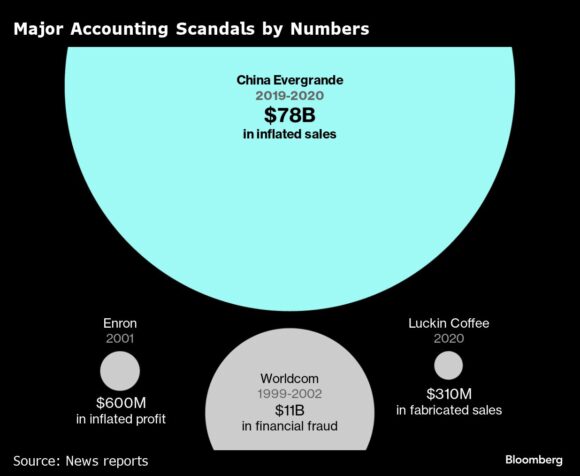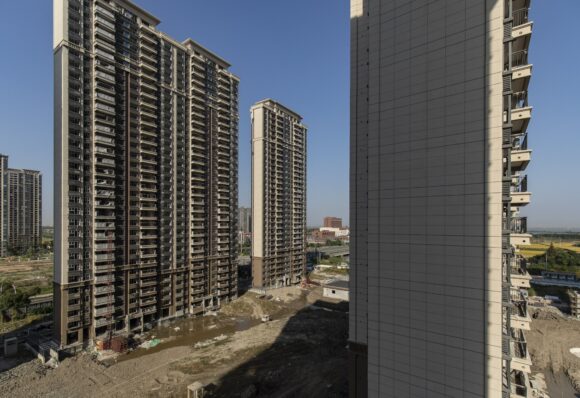China Evergrande Group’s alleged $78 billion revenue overstatement escalates the legal peril of founder Hui Ka Yan, who now stands at the center of one of the biggest financial fraud cases in history.
The nation’s top securities regulator said the developer’s onshore unit inflated revenue by recognizing sales in advance in the two years through 2020 that led up to its default. It imposed a 4.18 billion yuan ($581 million) fine against the unit.
Evergrande’s alleged fraud dwarfs that of Luckin Coffee Inc. and Enron Corp., dealing a blow to the reputation of its former auditor PricewaterhouseCoopers LLP and the country’s financial oversight. It fuels concern about how widespread such accounting issues are, just as the new China Securities Regulatory Commission chairman is trying to tighten oversight.
The fine also means Evergrande, with about $332 billion in liabilities, will have even less money to pay off global creditors, despite a Hong Kong court ordering the company to be liquidated in late January.
“The alleged fraud is shocking in its scale,” said Brock Silvers, managing director at private equity firm Kaiyuan Capital. “Hui became an expected civil and criminal target as soon as Evergrande was ordered into liquidation.”
The allegations mark the latest blow for Hui, once among Asia’s richest tycoons, who oversaw a sprawling empire that spanned real estate to electric vehicles. Evergrande was one of China’s biggest developers, taking on massive debt to expand across the country as condo sales boomed.

The CSRC’s action may pave the way for more serious charges against Hui, who was detained by police last year due to “suspicion of illegal crimes.” No criminal charges against Hui have been made public and his whereabouts aren’t known. The levies are administrative penalties.
Regulators allege Hui instructed other personnel to “falsely inflate” annual results. The onshore unit Hengda Real Estate Group boosted its 2019 revenue by about 214 billion yuan, and another 350 billion yuan in 2020, the regulator said. The inflated figures accounted for half of Hengda’s total revenue in 2019, and 79% in 2020.
As the supervisor in charge, Hui used particularly “egregious” means, the regulator said. Hengda also used these inflated figures in marketing to issue a combined 20.8 billion yuan in bonds, the regulator said.
“The CSRC fines may serve as a warning to owners of other defaulted developers that failing to collaborate with authorities over debt restructuring could result in severe consequences,” said Zerlina Zeng, senior credit analyst at Creditsights Inc.
Evergrande used to recognize revenue from apartments including those that were presold but yet to be delivered. The developer said last year that it changed its approach since 2021 to book revenue after the units were completed or occupied by their owners.
Hengda’s auditor in 2019 and 2020 was PricewaterhouseCoopers Zhong Tian LLP, a mainland entity affiliated with PwC’s network. PwC resigned as Evergrande’s auditor in January 2023 due to audit disagreements.
PwC has also resigned as auditor for other Chinese developers including Sunac China Holdings Ltd. and Shimao Group Holdings Ltd. In Hong Kong, the city’s Financial Reporting Council said in 2022 that it was looking into Evergrande’s financial statements for 2020 and expanding an investigation of an audit carried out by PwC. The auditor didn’t respond to requests for comment.
“The more alarming question is — given than many other real estate developers have faced financial distress — who else relied on accounting gimmickry to buy them time,” said Joel A. Gallo, an adjunct professor at New York University in Shanghai. “Regulators should pose tough questions to the industry and their auditors.”
The CSRC’s fine against Hengda, while among the largest ever in China, trails that of the 7.1 billion yuan slapped on fintech giant Ant Group Co. for policy violations.
Hui was fined 47 million yuan for the falsified results and other alleged violations, and banned for life from capital markets activities. Other former executives Xia Haijun and Pan Darong were also among people punished with fines and market bans.
Salvage Assets
Global creditors have been struggling to salvage their assets, as most of Evergrande’s project are on the mainland. They are also competing with other parties, including Chinese retail investors who bought into the company’s wealth management products, homeowners waiting for the firm to deliver presold apartments, and unpaid suppliers and construction workers.
Evergrande’s onshore unit faced a total of 318 billion yuan in unpaid debts and 200 billion yuan of overdue commercial paper at the end of January, according to a filing. It was also dealing with 2,094 legal disputes amounting to 516 billion yuan in total.
The regulatory action comes as China continues to grapple with a property downturn that has eroded economic growth and household wealth, as home sales and prices tumble. A Bloomberg gauge of China developer stocks dropped 2.1% on Tuesday, taking losses to 19% this year.
Some investors welcomed the CSRC’s move, seeing it as a positive step for financial regulation. “This is a good thing,” said Yu Yingdong, general manager at Shenzhen Cowin Asset Management Ltd. Regulators are expected “to keep the pressure on in the future.”
Once Asia’s second-richest man, worth $42 billion at his peak in 2017, Hui has seen his wealth plummet to about $1 billion after the developer defaulted in 2021. Evergrande’s stock has tumbled and was eventually suspended from trading.
“To improve investor confidence in a sector that has weighed down the market, transparency, which has been murky so far, needs to be demonstrated,” said Gallo.
Photograph: Residential buildings under construction at China Evergrande Group’s Riverside Palace development in Suzhou. Source: Bloomberg
Was this article valuable?
Here are more articles you may enjoy.



 Insurance Broker Stocks Sink as AI App Sparks Disruption Fears
Insurance Broker Stocks Sink as AI App Sparks Disruption Fears  Former Broker, Co-Defendant Sentenced to 20 Years in Fraudulent ACA Sign-Ups
Former Broker, Co-Defendant Sentenced to 20 Years in Fraudulent ACA Sign-Ups  Florida Engineers: Winds Under 110 mph Simply Do Not Damage Concrete Tiles
Florida Engineers: Winds Under 110 mph Simply Do Not Damage Concrete Tiles  Munich Re Unit to Cut 1,000 Positions as AI Takes Over Jobs
Munich Re Unit to Cut 1,000 Positions as AI Takes Over Jobs 

